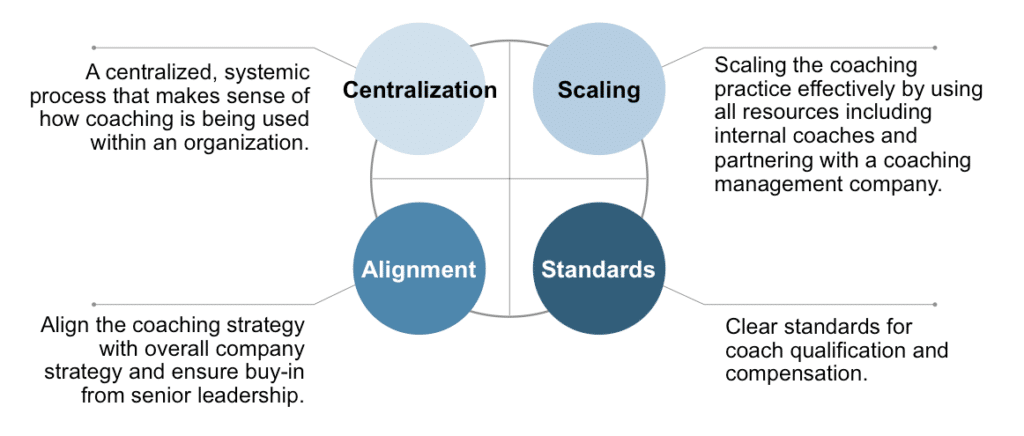Leadership is important. Engaging, retaining, and developing leaders is critical to the success of an organization and one method that many organizations utilize is individual executive coaching. Although executive or business coaching is undoubtedly a critical component of an organization’s leadership development strategy, the resources for it are often limited. Determining who receives coaching, what the components of the coaching process are, and what assessments to use are all critical questions that take time and experience to answer. One viable solution to this problem is for organizations to partner with a firm that specializes in providing trained and experienced coaches on demand.
When done effectively, everyone can agree that coaching is a value-add to a client’s talent management strategy in a multitude of ways. Research by The International Coach Federation, based on feedback from coaching participants, suggests that those who engage in coaching have enhanced productivity, improved communication skills, greater self-confidence, improved work/life balance, and stronger skills in business and time management.
In early February, CCI Consulting’s Rachel Medvin spoke at the annual Society of Consulting Psychology’s (a division of the American Psychological Association) midwinter conference on the topic of “The Business of Talent Development.” Held this year in Savannah, Georgia, the conference was attended by over 200 consulting psychology professionals and students with topics ranging from newly-developed multi-rater (or 360-degree) assessment instruments to case studies about how organizations identify and develop high-potential talent through executive coaching.
In her presentation, Dr. Medvin spoke about the benefits and disadvantages of internal versus external coaching. When an organization offers executive coaching, an important variable to consider is whether an internal or external resource is best suited for the leader and organizational culture. To set the stage, these resources can be understood with the following definitions:
- An internal coach is an employee of the organization, generally someone in Human Resources or Organizational Development, or a similar function.
- An external coach is a third-party individual who is hired by the organization on a contract basis, to provide coaching services.
Although there are many factors that go into the decision-making process, the items that are top of mind include:
- The organization’s sophistication and experience with coaching;
- The coaching opportunity, participant’s role, and program stakeholders;
- Timeframe; and
- Budget
Internal coaching programs are ideal when there is a high need for reliability and consistency in approach, or when an efficient integration with the environment and culture is required. Financial considerations are also important – traditionally, internal resources are less costly. However, when coaching is provided by an internal employee, issues can arise with role clarity and accountability, leading to blurred interpersonal boundaries and lack of confidentiality. In contrast, external coaches are ideal in situations when clients are at the top of their organization or when objectivity and confidentiality are crucial to engagement. Because external coaches have often held senior leadership roles in a variety of industries and organizations, they can offer nuanced support around coaching goals from an unbiased perspective.
In the 2016 Global Executive Coaching Survey, The Conference Board points to four key needs for organizations to ensure success and growth of talent development initiatives:

- Centralization. In the 2006 report, coaching strategy was primarily handled by business units. By the 2010 report, it had moved to the enterprise level. In 2016, a clear need was identified for organizations to create a more centralized process for executive coaching utilization and tracking.
- Alignment. It is critical that there is alignment between an organization’s business strategy and their coaching strategy. This linkage makes it possible to embed coaching within leadership development, onboarding, and other programs.
- Standards. Over the 10 years that The Conference Board has been surveying executive coaching, there is a clearly defined trend towards the need for defined qualifications for external coaches, including compensation and fee structures.
- Scaling. When coaching has buy-in from senior leadership, there’s often a greater demand for development programs which, in turn, can lead to complex, challenging, and costly scenarios. Companies often handle this in two ways: considering all resources including internal coaching, and partnering with a coaching management company.
In the 2016 ICF Global Coaching Survey, 44% of coaches and 45% of managers/leaders identified concern about untrained individuals who call themselves coaches as the primary obstacle. Partnering with a coaching management firm ensures that this is never an issue. A few of the benefits for this kind of partnership include:
- A vetting process ensuring that only trained, qualified, and experienced coaches are considered;
- A dedicated account manager who oversees all aspects of client management and streamlines services;
- Time saved through outsourcing of coaching;
- Flexibility with designing and delivering programs; and
- Consistency regarding invoicing schedules, fees, and reporting / tracking.
At CCI, we pride ourselves on designing custom built solutions for our clients. Through Career Partners International, we can provide local coaches for organizations across the US and abroad in Canada, Latin America, Europe, the Middle East, Africa, and the Asia-Pacific region. With a bench of over 40 expert executive coaches in the Philadelphia area alone, we are not only able to leverage their strengths and diversity in support of our clients, but stay ahead of the curve in a 21st Century workforce.
Rachel Medvin, Psy.D.
Senior Talent Development Consultant
CCI Consulting


